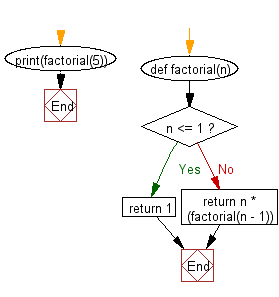Python Data Structures and Algorithms - Recursion: Factorial of a non-negative integer
4. Factorial Using Recursion
Write a Python program to get the factorial of a non-negative integer using recursion.
Sample Solution:
Python Code:
# Define a function named factorial that calculates the factorial of a given number 'n'
def factorial(n):
# Check if 'n' is less than or equal to 1
if n <= 1:
# If 'n' is 1 or less, return 1 (base case for factorial)
return 1
else:
# If 'n' is greater than 1, recursively call the factorial function
# to calculate the factorial of (n - 1) and multiply the result by 'n'
return n * factorial(n - 1)
# Print the result of calling the factorial function with the input value 5
print(factorial(5))
Sample Output:
120
Flowchart:

For more Practice: Solve these Related Problems:
- Write a Python program to compute the factorial of a non-negative integer using a basic recursive approach.
- Write a Python program to implement tail recursion for calculating factorial and compare its efficiency.
- Write a Python program to calculate factorial recursively with error handling for negative inputs.
- Write a Python program to recursively compute factorial and use it to solve a combinations problem (n choose k).
Go to:
Previous: Write a Python program of recursion list sum.
Next: Write a Python program to solve the Fibonacci sequence using recursion.
Python Code Editor:
Contribute your code and comments through Disqus.
What is the difficulty level of this exercise?
Test your Programming skills with w3resource's quiz.
